Pastorale
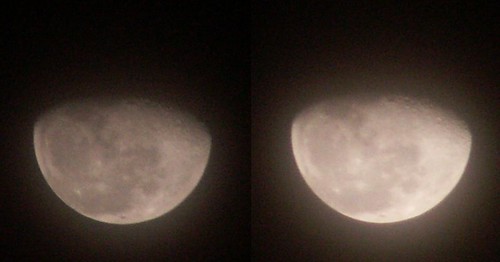
The photo on the left used a 1/30-second exposure to show the mare. The one on the right used a 1/15-second exposure to show craters at the terminator. Both were shot at f/8. I did not set out to create a stereoscopic view, but I get one (combining the benefits of both pictures) when I cross my eyes and then relax my gaze while slowly focusing the "center" image. *Grin*
Across our neighborhood the streets fill with lights: multicolored stars hanging off palms, electric icicles whose touch would melt the real thing. The Moon rises later each night, continuing to shrink. Just before the New Year it will start to grow again.
Last night I broke from a transcription job to step outside, where a waning gibbous, 73 percent of full, looked down through a layer of haze. Not perfect conditions to photograph, but good enough. Shortly after midnight, almost 12 hours before Solstice, I put on my neck gaiter and cap and a thick wool sweater. Up in Boston that's late September dress, but here it was enough to keep me warm as I set up my tripod in the dark.
Hours earlier Mary and I had walked home as the sky filled with Florida lava....
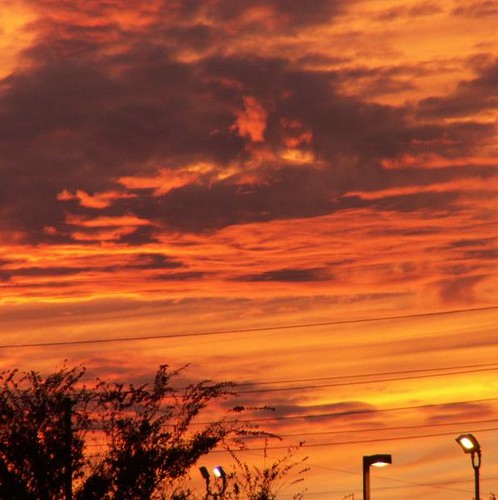
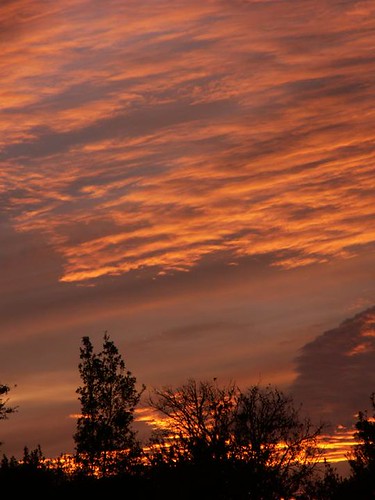
To the right out of frame is our town fire station (no need to put out this one!) with large green recycle dumpsters out back. To the left out of frame is a housing project. We're looking toward the county road.
Before heading home we had stopped at the "post office pond," looking for signs of wildlife. Instead we came upon a mirror beneath whose skin mulch slowly decays. It was our version of M.C. Escher's "Three Worlds".
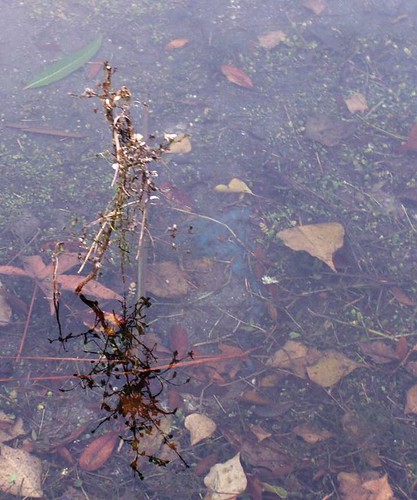
The insects camouflage themselves now, to match our version of winter. This gal seems to fit the coloring, shape, and size of a female goldenrod spider, which comes in a variety of colors and ranges throughout North America and southern Canada. The goldenrod spider (Misumena vatia) is in the Family Thomisidae, or Crab Spiders. This one seemed around 3/8-inch, typical for females of the species.
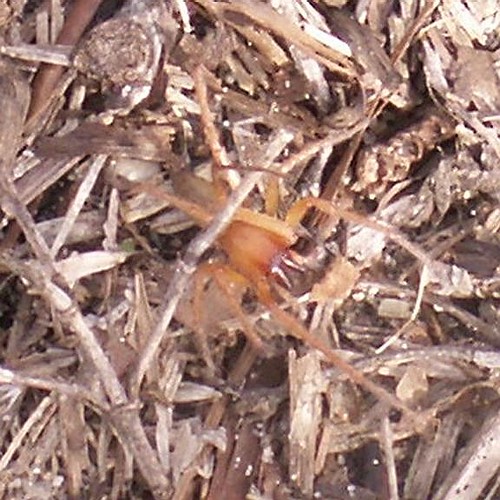
"These spiders wander over the ground, climbing flowers and plants in search of prey," according to the Audubon Society Field Guide to North American Insects and Spiders. "They do not spin web snares, retreats, or overwintering nests, but the male of some species may cover a prospective mate with loose silken webbing and tie the female down. The female produces a silken sac for eggs, usually guards it for a while, but dies before spiderlings emerge."
There are more than 200 species of North American crab spiders. The goldenrod changes its coloring to yellow, to camouflage it on yellow daisies and goldenrod. I found this one at the edge of the road, headed for mulch. By the time I was ready with the camera she had taken refuge beneath a small brown leaf, finally making an appearance after I'd coaxed her out with a twig the size of a toothpick. Further down the road a small patch of dirt was littered with broken acorns.
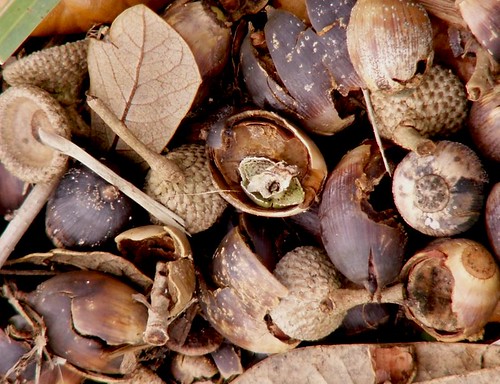
More vivid colors hide themselves inside evergreens. Our local bank (the same one that had closed for Hurricane Wilma) has juniper bushes as part of its landscaping...
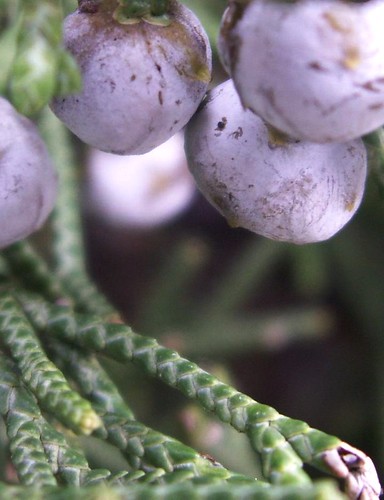
... while holly berries dot our front hedge.
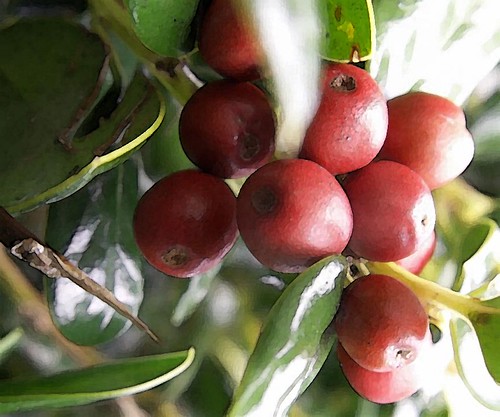
Inside the heat kicks on, almost as an afterthought. Winters are subtle here. They are quiet. Riding mowers and weed whackers fall silent as lawn care takes a holiday. The air has emptied of buzzing dragonflies and filled with turkey vultures circling patiently high overhead. Paper wasp nests slowly crumble. Bagworm moth chrysalids dot fences and posts; a tiny one sticks to our front window.
Today I will again check the painted brick post between the bakery and the pool supplies store, where high up just beneath the overhang Mary had spotted a moth shape. When I downloaded the photos I wondered if I was looking at a creature in mid-transformation, part moth part chrysalis. I want to see if it's changed.
Our cats luxuriate in the warmth of home. I finally used my camera's video option and pulled these four stills from my first "short film." Often when Red grooms Daisy it's to grab her rest spot, but that wasn't the case here. This time she was quite happy to let him give her a bath and nibble her head on occasion. Afterwards she kept her spot and Red went off to nap by the window.
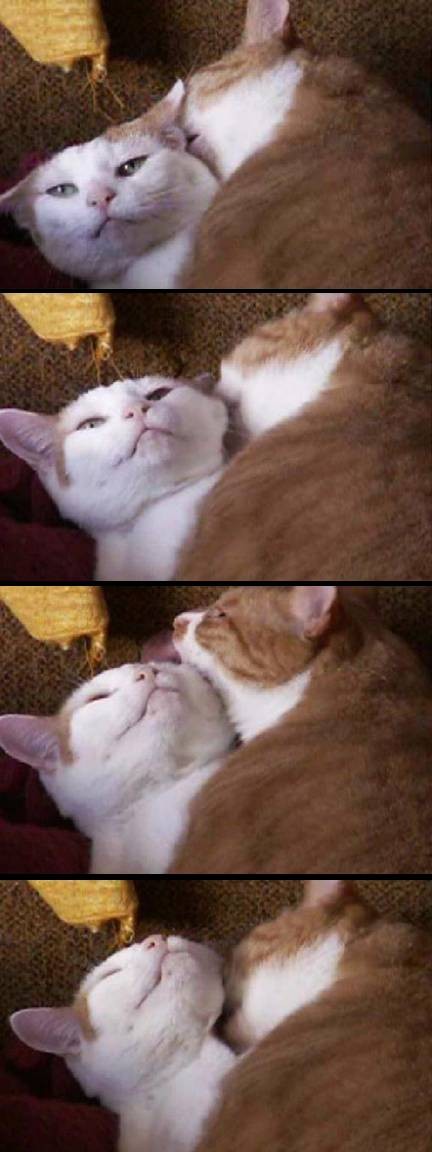
Wishing you all peace, happiness, and love as we shift into the new season.











1 Comments:
A sky of Florida lava, wow. Molten heavens, indeed. The insects, a world for a botanist, your kitty, so cuddly. As ever, stunning photos... xo
Post a Comment
<< Home